Ten Imperfect Cicada Metaphors for the Apocalypse
Brood XIV screams, the disaster screams, we all scream for something better than this.
I’m lucky that Mary is also a dear friend. She is as loyal, kind, fierce, passionate, funny, and tender as her writing. Mary, her husband, two young sons, two dogs, and a bearded lizard lived through Hurricane Helene and the aftermath. In fact, they were right in the center of it: Swannanoa, North Carolina. The part that appeared in much of the news coverage. For three terrifying days, I didn’t know if she was alive! She was! And she’s now written this gorgeous essay that is in part about her experiences to stay alive, in part about disaster utopias, in part the exhausting drone of politics, in part collective liberation, and in part about cicadas. And wholly about tending to one another, the planet, and all her beings.
Her work has appeared in The New York Times, Los Angeles Review of Books, and the Washington Post, among others.
Mary also honored Beyond by being our first Guest Contributor! So if you enjoy this essay perhaps check that one out, too. It’s about grief: short but so so potent.
Mary has recently started her own newsletter called
. Of course, it’s fantastic. She and her family continue to live in Swannanoa where they’re healing alongside the land and the community.Prepare to have your heart and mind blown open! Let me know what you think in the comments.
xJane
Ten Imperfect Cicada Metaphors for the Apocalypse
I love the sound of cicadas. Their percussive trill takes me back to Southern Summers of my childhood: lazy sweet watermelon dripping down your chin, chlorined lycra and jasmine blooming into the humidity, star-spangled infinite warm nights, books in hammocks and plumped tomatoes on the vine.
What is happening now is something different than this.
Collectively, the prolific 17-year brood of red-eyed, black bugs scream all day in our small town in Western North Carolina like an incessant car alarm. Over the mountain we live on, their calls meld together into a noise that rises like an eerie, alien electrical substation. I’ve never in my life heard anything like it.
The noise finds me all hours of the day, inside the house, in the woods, in the school pick up line.
It reminds me of the news. Even when you avoid it, its horrors still hum in your background.
It reminds me too of living here in Swannanoa after disaster came last September with the arrival of Hurricane Helene.
It’s everywhere, omnipresent and inescapable. It’s out our windows. It’s in our broken land. The broken buildings that line the river. And in so many who are still caught in the undertow of the aftermath.
It’s woven in the fabric of our days, like the cicada screams.
Cicada Fact #1: The ones screaming are the males.
Of course they are.
Sometimes it helps me to reframe the noise as “the screams of a dying patriarchy.” Sometimes it helps me to reframe politics this way too.
The disaster, however, won’t square up. IMHO, this was nature screaming for us to turn this all around.
Same goes for the atrocities in Gaza. For the fact that many traumatized flood victims are still going round and round with FEMA and insurance companies to little avail. For ICE raids tearing apart families.
After the disaster, I have no patience, no chill, for the injustices of this world that just make no damn sense.
Cicada Fact #2: You can’t escape the noise.
Sometimes the sun is too bright and the cicada screams are too loud and my noise canceling headphones do not, as they say, cancel the noise. And one cannot take to the woods for soothing, because that is where the cicadas are too.
It’s kind of like when Trump came to Swannanoa post-Helene to stand on a red carpet placed over flood mud, the historic and improbably flooded Beacon Village a backdrop as he tore apart FEMA, who was in fact here helping, albeit imperfectly.
We hadn’t had potable water for weeks at that point, and I needed to take my plastic buckets to the shuttered Ingles’ parking lot to fill them from the giant steel tanker truck brought in by the military.
He blocked the then-singular route in and out of my community, limited by stream-and-river broken roads and bridges. I huddled in my room waiting for him to leave, curtains drawn, trying to pretend he wasn’t just a few blocks away.
But I couldn’t shake his presence.
The cicadas’ omnipresent screaming also reminds me of when the woods were the only safe place during the pandemic, so I roamed the trails.
But what was inescapable then, what came into harsh focus, were the skeletons of dying Hemlocks. The invasive Vinca and English Ivy and Multiflora Rose and the trees of heaven. Evidence of industrial colonization that crowds out native species.
The pandemic gave me the time and lens to notice these things.
The disaster itself forces you to notice it, no matter your time or focus. The landslide around our home, the broken banks of our rivers still littered with detritus, the businesses missing the backs of their buildings, the homes that once stood where there’s now bare land, the people living in campers and sheds and vehicles who still don’t have access to clean water, the fallen oaks scattered like matchsticks on the forest floor.
Wherever you go, there you are.
Cicada Fact #3: You can eat them.
Sauteed, they taste like popcorn. Or beans.
I don’t actually know what they taste like, but you can ask my little dog. She’s taken to wandering our property and gorging herself on the swarms of the demon-looking bugs.
The thing is, as much as I’m not a fan of their raucous cacophony, I don’t want to kill them. I’m emphatic about this to others whenever they wish away a fascist problem with a quick fix of death.
This is simply wrong. It perpetuates the very systemic violence we’re trying to solve here.
And, if you kill one cicada, there are plenty more where that one came from. If we yell at them and call them idiots or try to ignore them, it doesn’t change anything about their pitch, their volume, or their lifespan. They remind me a little of all the fear-based headlines screaming for our attention, hijacking our nervous systems.
Best I can do, I think, is try to tolerate their noise until they crawl back underground to gestate for another seventeen years.
This advice does not, however, apply to current politics.
Cicada Fact #4: They survived landslide mud.
Like us, like my family. At around 9:30 in the morning that Fateful Friday in September, mid-Helene relentlessly thrashing and pouring, our soils reached a saturation point.
All around the county, land turned liquid, unleashing countless debris flow landslides charging furiously down mountains, bringing with them rushing torrents of trees and boulders and sometimes homes.
It was unprecedented, this geopolitical event. Warnings were dire but still too few and far between, and most people, including many local officials, didn’t grasp the enormity of what was coming until it was too late.
Those of us that were able to metabolize the warnings ahead of time, like myself, were often dismissed. I don’t think many people can easily conceptualize disaster. Normalcy bias is strong, particularly when our behavior is trained by algorithms and advertisements, exhausted by capitalism, poverty, and/or calibrated to privilege, and divorced from ancestral earth wisdoms and bodily knowings.
What I didn’t yet know, but discovered that morning: when you’re standing on your front porch watching the land dissolve around you, come rushing at you, the ground thunders like earthquake. It feels like watching a high-def disaster movie in slow motion, on the biggest of screens. You realize you might die. The noise imprints on your nervous system though your conscious memory blots it out.
You freeze, rather than fight or fly. Or I did anyway.
Until our 10-year old led the charge with our rescue German Shepherd, both of them taking turns leading our family up a treacherous climb mid-tropical storm, the soil giving way underneath our hands and trees falling around us as we clawed our way up a steep mountainside and appeared at our neighbors’ home as traumatized, transformed mud creatures.
A small copse of trees saved our house, split the flow around us.
The land-slid, debris-littered terrain surrounding our home, where we used to roam and play in the woods is now rutted far too deep beneath the previous topsoil for the cicadas to have survived.
But on the periphery, where the mud flowed over existing land several feet deep, the surface is punctuated with hundreds upon hundreds of cicada holes, from this brood of periodic cicadas who had been biding their time below our feet.
Cicada Fact #5: Their time here is finite.
Here’s where the metaphors diverge a little. We know this ephemeral brood will retreat soon, giving way to the more gentle, harmonic annual cicadas that emerge every year. That’s part of what makes it somewhat tolerable.
The disaster is enduring.
For the people most impacted, like this survivor, the trauma continues every single day. Families who lost homes, loved ones, and businesses, are now left to manage the ruins of their lives without simple, straightforward solutions, and many are still living in temporary, inadequate housing without access to basic needs. Many are still unemployed, or underemployed. Our only local grocery store remains shuttered, an inconvenience for some, but an incredible barrier to food security for others with disabilities, mobility challenges, and/or limited access to transportation.
I hope their experience eventually serves as a harbinger of broken systems, and their stories, from their own mouths and shared with agency and permission and only if it feels right to them, can inform how we fix them together.
For the incredible grassroots organizations formed in the wake of the storm that have been working together with the most impacted, like Swannanoa Communities Together and Grace Covenant Presbyterian Church, this is a marathon.
I hope that their mutual aid, where resources flow with little red tape, judgement, or prerequisite, to community members from all backgrounds, their fierce advocacy for housing, and their commitment to sharing power and wisdom can serve as a blueprint for building back more sustainably and equitably.
For artists like this photographer who continues to give of herself and her work to serve community in the wake of the storm, I hope her haunting poetry and photography signal to others the urgency of this ecological crisis.
These absurd politics, on the other hand? May they be finite. May they burn themselves out like a poorly built fire and give way to something better.
After the disaster, I wrote a post that said:
“If billions of individual raindrops can collectively re-make a landscape, then can billions of individuals bind together in localized action to re-make a world, an ecosystem?”
I dream of collective liberation. I am wildly, illogically hopeful. Because I emerged from the landslide and the news cycle changed, and ready to scream about it.
May we be powerful like water.
Cicada Fact #6: Sometimes I like to pretend the noise is an emergence of something better.
This metaphor doesn’t really make sense, because it’s only the males screaming and because they are screaming for sex and because the noise is honestly gawdawful.
I’d like to think collective liberation would be a perfectly tuned and resonant orchestra, all of us playing our parts in harmony, right on time, in perfect pitch.
So maybe this discordance is simply the prelude?
I can’t shake the night of the election last November when I went to a late evening yoga class, one of my favorites, where we all move together to music like dancing. I felt power flood my body, my hands, my belly, from the depths of the earth below my feet.
Moving collectively, we emanated that power, through our roots and into our bodies and out our palms. We created palpable energy in that hot room.
We were going to have a Black woman helm our country for the first time ever. I was unshakable in that conviction. This was divine feminine rising, hope transcending the disaster.
My intuition is rarely wrong. Two days before the landslide, I told my husband I was concerned about landslides on our mountain. In early January 2020, I told my husband a pandemic was headed to our shores.
Oftentimes, my intuition is a simple but pervasive bodily knowing, informed by lots of reading, information seeking and synthesizing, and excellent pattern recognition.
This bodily knowing is an element of the divine feminine. And our society is sorely lacking in it. The way we live, our allegiance to the almighty dollar and a falsehood of perpetual economic growth despite limited resources and dogma delivered by other’s mouths that often keeps us from it.
Later that night, as I watched the swing states light up red on the map as Musk lit up with glee, I felt a darkness fall over my flickering hope like a heavy black cloak.
Cicada Fact #7: They can play Canon in D.
Apparently, scientists with electrodes hijacked the poor things and turned them into musicians.
This is the kind of solution I wouldn’t shy away from, I don’t think, if somehow, of their own volition, the cicadas would suddenly just break into song on the mountain.
Cicada Fact #8: They feel a little like a cosmic joke.
The cicada memes and musings here locally have been lit on social media these past few weeks. Loud horny male bugs are a ripe subject for ridicule.
Last year’s emergence was apparently supposed to be louder and more prolific, and yet here we are, entrenched in what feels like never-ending unprecedented times, our broken landscape covered in swarms of screaming insects and an apocalyptic echo rising over the valley.
One really really good thing about a disaster is the camaraderie that comes with it. We share PTSD, sure (local social media is also now lit with lament and support with the arrival of heavy rains or wind), and recovery is decidedly inequitable and messy in ways that are really hard to understand or metabolize, but we also share an experience that binds us together, and sometimes dissolves into a hilarity that only those who were collectively traumatized are privy to.
It’s why when, a few weeks ago, my husband and I were woken from Sunday morning slumber at seven am by a phone call from the debris removal contractors saying they would be here in ten minutes, with no other warning, and then they removed a singular tree instead of the landslide’s worth that they’d promised, all I could do was laugh.
Ha, universe, I see you.
Another example: a few weeks ago our region was rocked by an actual earthquake, a 4.1 on the Richter scale. For a moment, I was certain the landslide was back as our house shook.
But to my delight, it ended quickly, and immediately the internet sparked with delicious End of the World as We Know it Lyrics and Taylor Swift Shake it Off memes.
Lenny Bruce is not scared of a little shimmy.
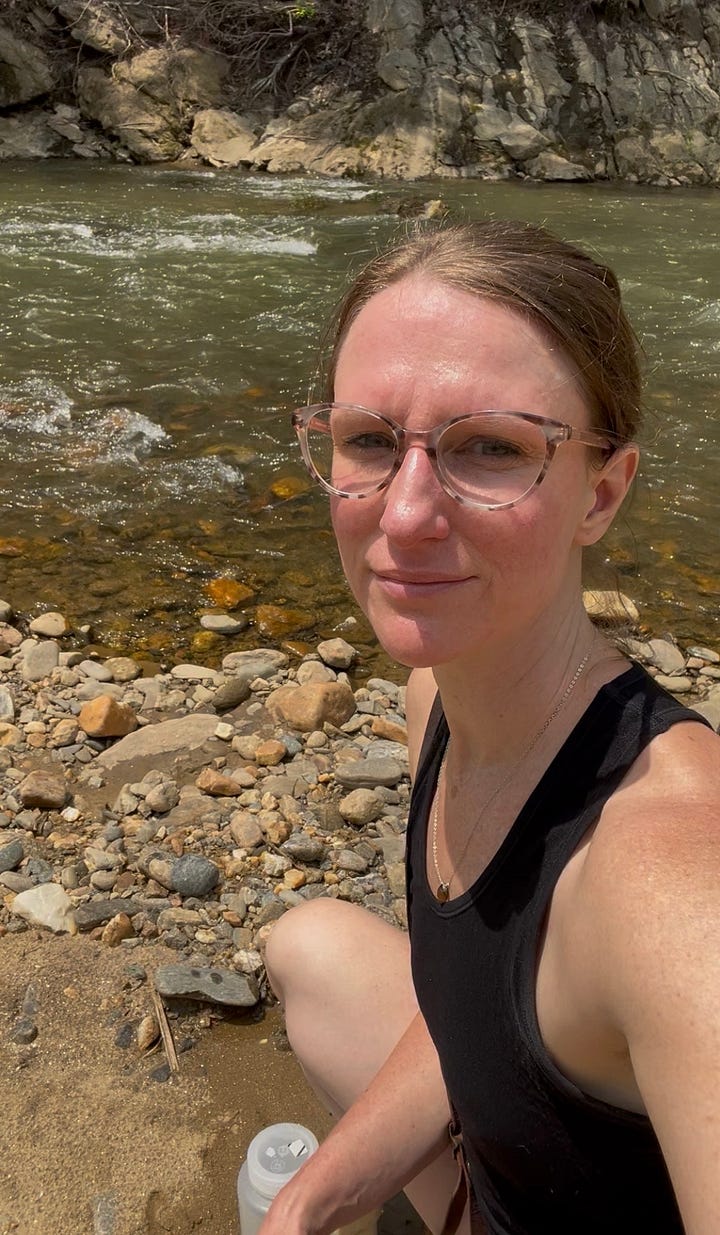
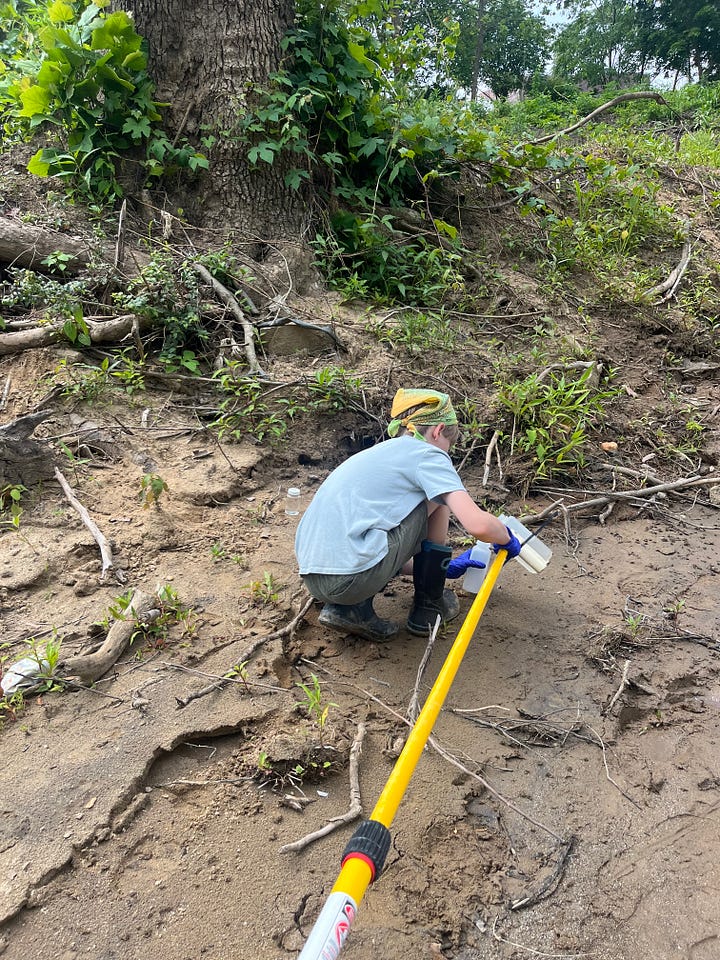
Cicada Fact #9: With a British accent, it’s pronounced ci-CAH-dah.
I know this because my current listen is Matt Haig’s The Life Impossible. The British narrator says it this way when she’s describing the ci-CAH-dah trill on the island of Ibiza, where the protagonist acquires mystic intuitive powers from the sea.
Here in Swannanoa, we say ci-CAY-duh with our Appalachian lilt.
Our local waters are the Swannanoa River, which is now muddied and chock full of E. Coli when it rains. I know this because my son and I traverse her broken banks to take water samples each week on the broken land the Cherokee once traveled by foot.
Last September 2024, the Swannanoa River flooded to utterly unprecedented levels. She smashed through all of her previous records, after a front stalled over the Swannanoa Valley and flooded our waterways and saturating our soils a mere two days before Helene arrived from the Gulf of Whatever You Want to Call It (either way it’s too hot), and she turned our mountainsides into white water and debris flows, our streams into life-taking maws of flood, and our rivers into powerful, sprawling, rushing monsters of unfathomable, roaring destruction, that took with them structures and people located bafflingly far away from the banks that normally contain them.
Cicada Fact #10: When I want to escape our problems, the cicadas remind me to stay present.
Honestly, if I had a magic wand and could fix it all right away I would. But unfortunately an easy fix like this isn’t possible. And as much as I want to hide from the cacophony, I literally can’t. I’ve tried.
So I’ve taken them as a lesson: the omnipresent screams help me to remember that though escapism is widely available to us humans in the form of screen-dopamine, shopping, drinking, and various other means, I no longer want to pretend like things are okay here on our planet.
But that doesn’t mean that I think we need to all work like dogs to fix it. In fact, I think the opposite might be true. I think, because I learned from the incredible advocates that came before me, that we need to work softly, with ample naps and snacks.
We are all ecosystems. Our bodies, our schools, our businesses, our communities. And if we’ve learned anything from disability activism and indigenous wisdom and Black Brilliance and trans visibility and the opioid epidemic and mental health & climate & current political crises, it’s that those systems need a hefty recalibration. That resistance and resilience and health and community are found in joy and care and showing up for each other, with regulated nervous systems supported by gentle environments that aren’t extractive of our beauty, of the earth’s beauty.
It lies in rest. It lies in regenerated soils and healed rivers with clean waters and nourishing foods grown sustainably, in restorative ritual and faith and creativity and art and meaningful work.
It lies in listening to one another as individuals, even when it’s hard and we don’t agree. In offering bold and brave feedback and hard truths. It lies in breaking bread with our neighbors. In approaching what’s different or unfamiliar with curiosity instead of judgement.
I don’t want to turn away from this noise. I want to lean into it, to transmute it. To use it as impetus to build something different from this, something in right relationship with the earth and with each other, and whatever form of God you do or don’t believe in. To break up abusive systems of power into ecosystems that remember that power is only dangerous when it forgets it’s shared.
So that collectively, all our brilliances can rise together in a gorgeous crescendo of joy-orgasm like the warming of a precisely tuned orchestra, like a sunrise. Like how big-hearted Trump supporters appeared with machines to dig us out of the mud and hugged us, despite the solar panels gleaming from our roof. Like how the Eastern Band of the Cherokee showed up to liberate neighbors that were trapped. How the Amish built small homes for the unhoused. Like the shared meals and shared resources that arrived in droves in the wake of the storm.
Like how when the storm came, we all got busy saving one another, and for a few days politics and identity fell away like a veil, and we were all of us just humans worthy of life, of care, of love.
Rebecca Solnit writes of the utopias that form in the wake of disaster, and how they often don’t last. I think this is, in part, because our economy demands a return to extractive, profit-driven, individual labor for individual survival, locked down by 40-plus-hour workweeks and social media algorithms and dogma that keeps us from each other and from our inner knowings.
But as I learned from the incredible women at Swannanoa Communities Together, when mutual aid networks begin weaving stronger and more far-reaching webs of care and regeneration like mycelium, maybe, just maybe, people of all stripes can eventually start tentatively exiting those extractive systems as some of that labor begins to be shouldered by new technologies, and we can spend time working hard together on the most real and human problems that plague us instead. Food security. Housing. Misinformation. Belonging. Disaster. War. Climate. Industrial agriculture.
Tending to this beautiful world and all of her beautiful living things.
But in a way that allows us all to rise, no matter our race, religion, gender, sexuality, background, in accordance with the earth, all our wisdoms and intuitions collapsing together in one Big Beautiful Flood.
And then maybe, just maybe, then we’d have an idealistic chance in hell of turning this all around.
Cicada screams be damned.
If you enjoyed this essay, you might also like this one by Grace Yoder:


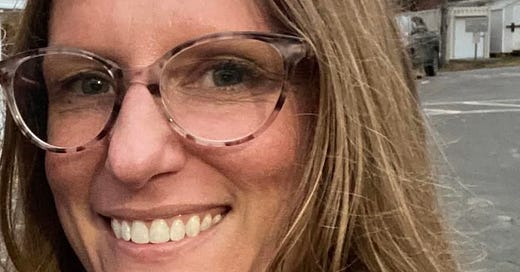




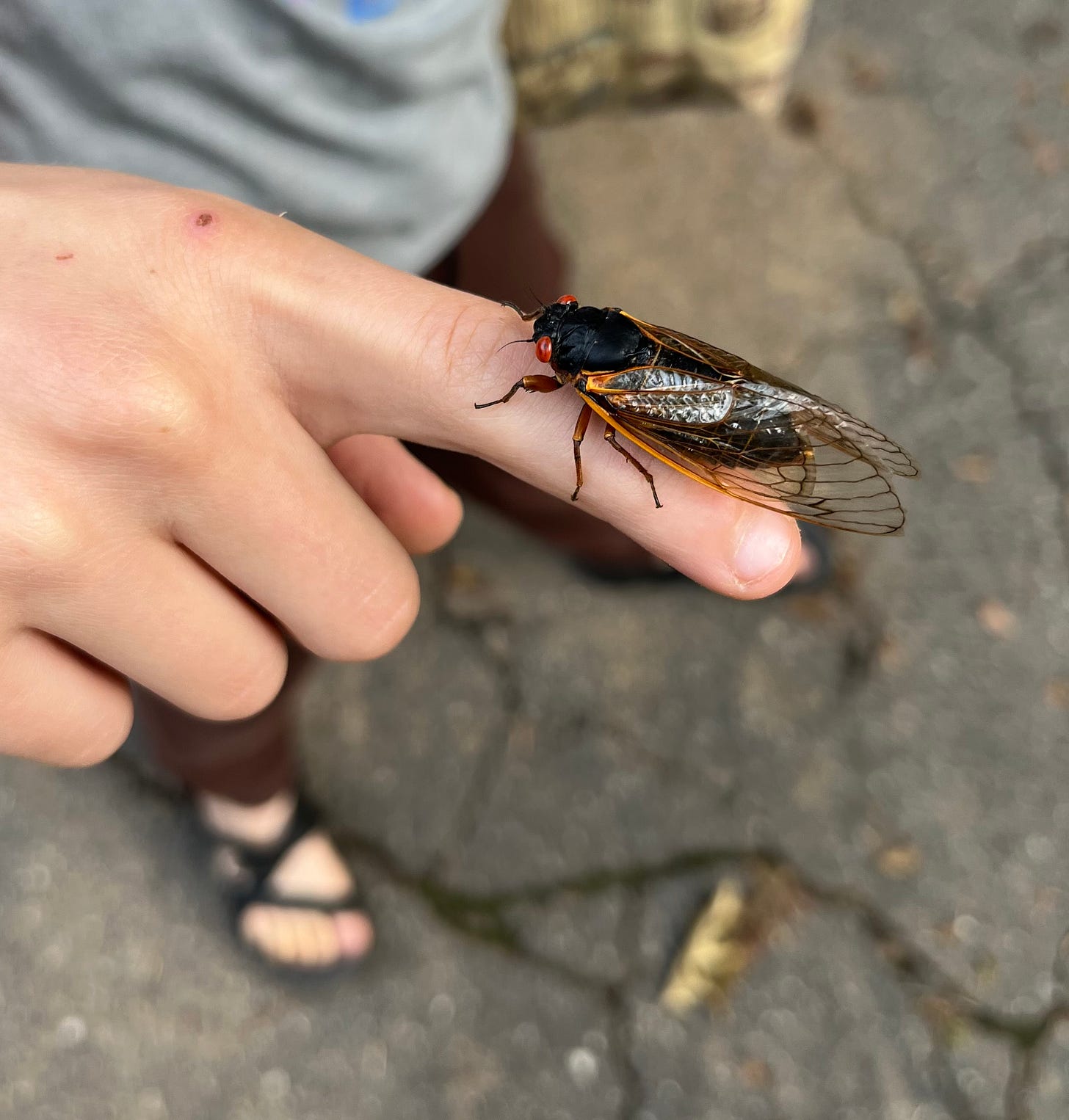

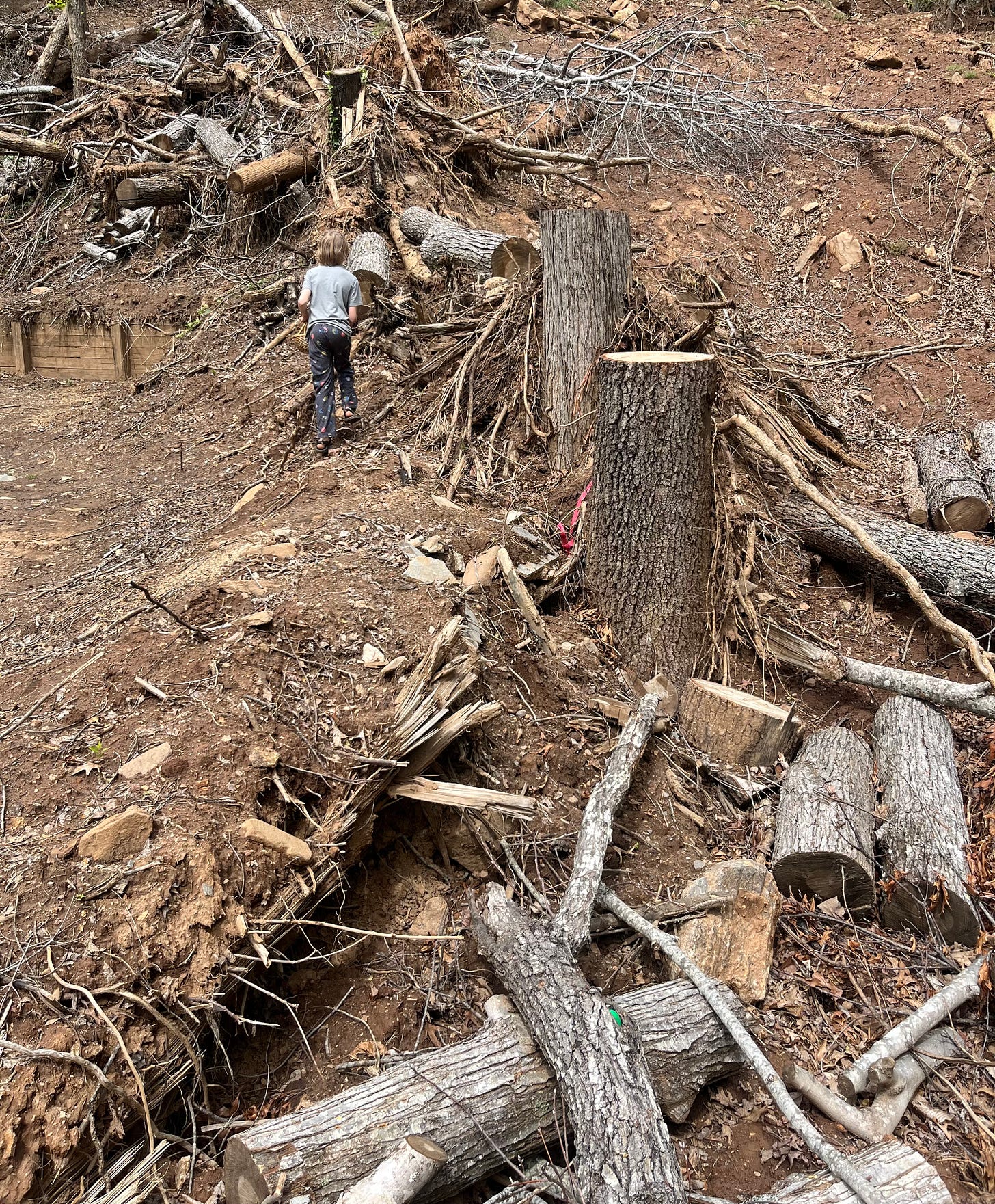
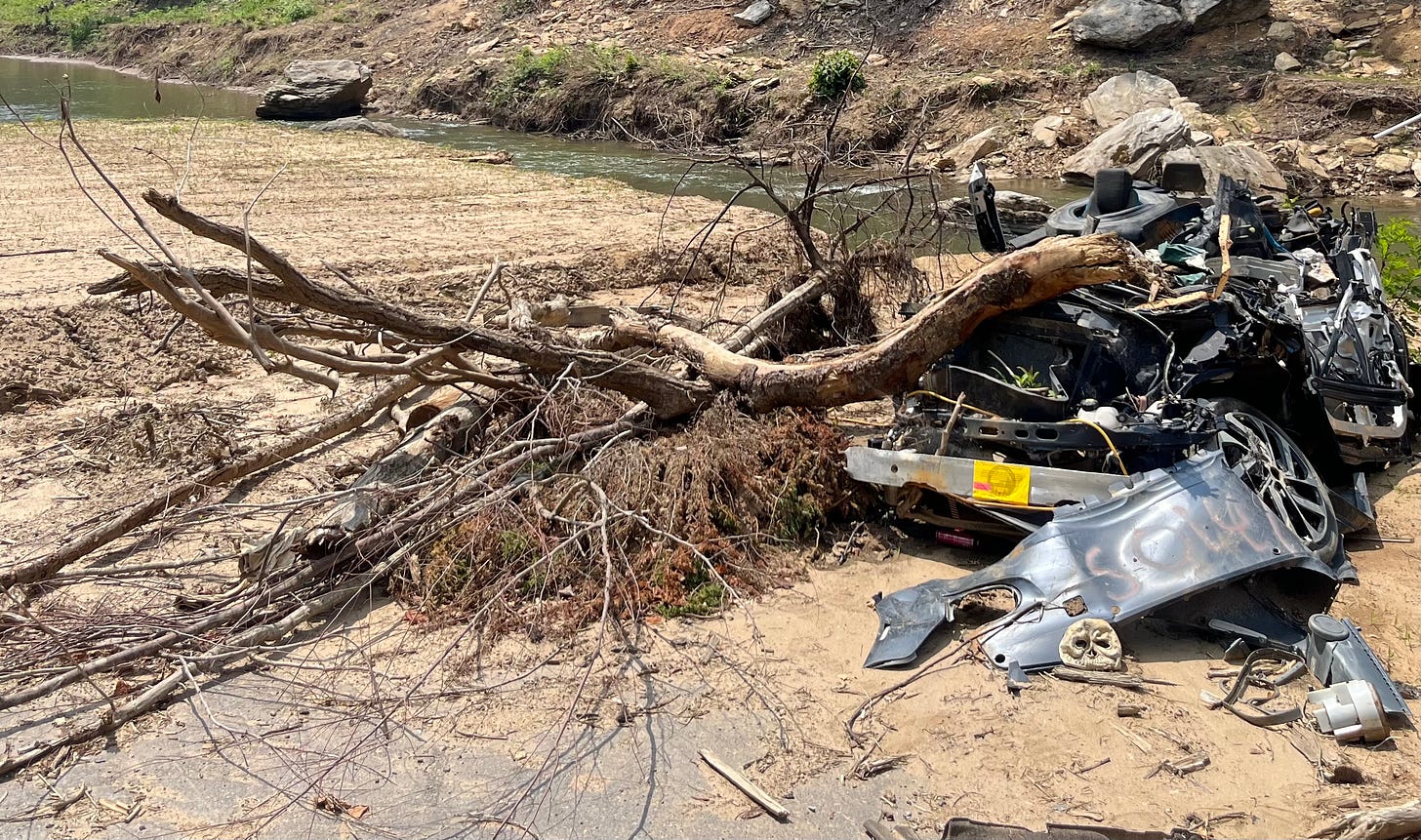

Thanks so much for the opportunity to publish with you Jane!
That was an incredible article about the cicadas. An interesting fact: I live in Mexico, and we call them the rain birds. Why? Because each May, they surface with their screeching sound, and, as legend has it, the rainy season will start six weeks after we hear the first ones. Many people make bets on the date. Also, here it's pronounced si--KAH-da. So here, because we look forward to the rainy season, they are a blessing. I don't know if anyone eats them, though. Your writing is beautiful, and the analogies are spot on. Thank you for writing this article.
Blue